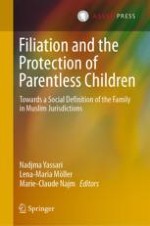2019 | OriginalPaper | Buchkapitel
2. Filiation/nasab and Family Values in Pre-modern Shiʿi Law
verfasst von : Robert Gleave
Erschienen in: Filiation and the Protection of Parentless Children
Verlag: T.M.C. Asser Press
Aktivieren Sie unsere intelligente Suche, um passende Fachinhalte oder Patente zu finden.
Wählen Sie Textabschnitte aus um mit Künstlicher Intelligenz passenden Patente zu finden. powered by
Markieren Sie Textabschnitte, um KI-gestützt weitere passende Inhalte zu finden. powered by
